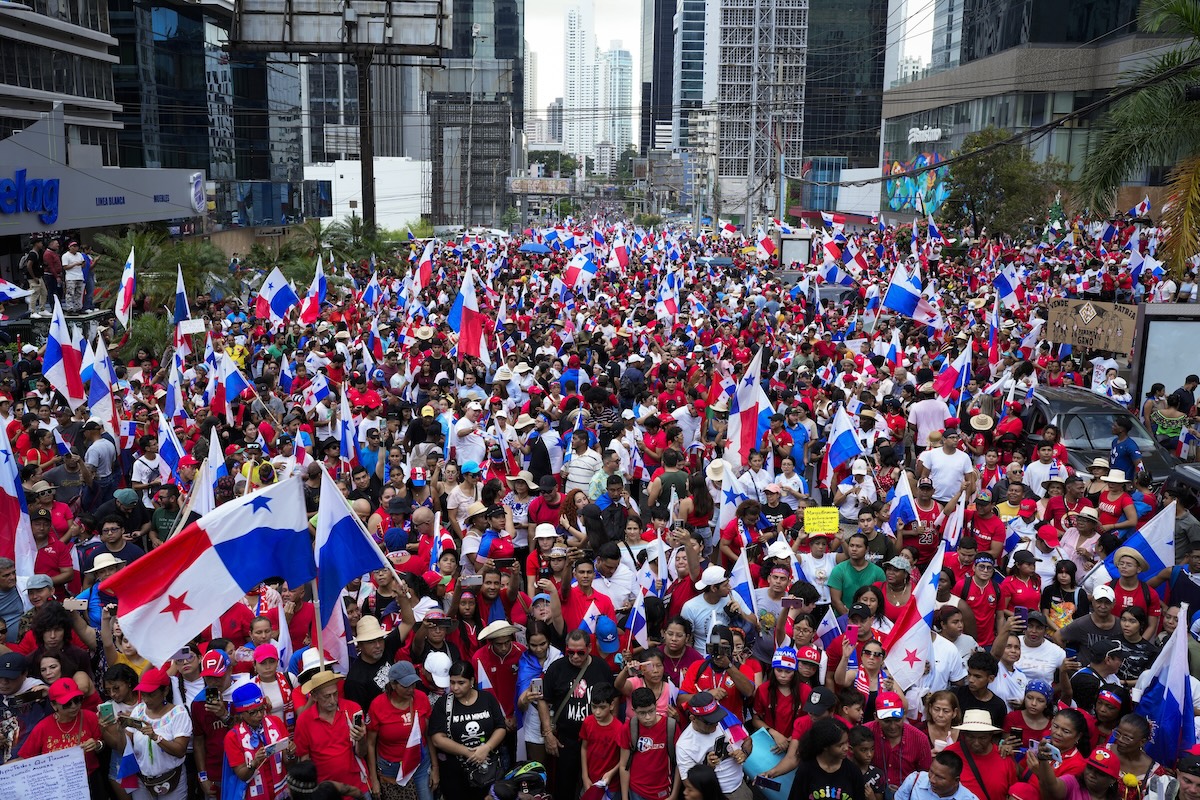Beginning in mid-October, Panamanian activists, led by the militant leftist labor union SUNTRACS, brought much of Panama to a standstill, blocking roads and filling Panama City with daily demonstrations against a copper-mining contract with Canadian firm First Quantum. Roadblocks caused gas and propane shortages, supermarket shelves ran bare, and restaurants and hotels sat empty. Already reeling from a drought that forced the Panama Canal Authority to decrease by half traffic through the global thoroughfare, the country’s economy plummeted as protests turned from days to weeks.
By early November, rating agency Moody’s downgraded Panama’s debt to its lowest investment-grade rating, citing financial issues and the country’s political upheaval, and S&P revised Panama’s outlook to negative from stable on potential risks to investor confidence and economic growth. And yet the protests continued, morphing from complaints about environmental degradation and underpaid laborers into a larger movement championing national sovereignty (demonstrations that strategically coincided with several independence-themed national holidays). That an American lawyer was arrested for reportedly shooting two of the Panamanian protestors on a major highway only further invigorated nationalist sentiments.
In late November, Panama’s Supreme Court declared unconstitutional bipartisan legislation granting First Quantum’s Cobre copper mine a 20-year concession, cheering thousands of Panamanians who claimed that the mine was an ecological hazard and that the contract’s terms were unfair and exploitative. In the unanimous decision, the high court ruled that the contract violated 25 articles of Panama’s constitution, including the right to live in a pollution-free environment, the state’s obligation to protect the health of minors, as well as a commitment to promote the economic and political well-being of Indigenous and rural communities.
The closure of Cobre, the largest open-pit copper mine in Central America, comes at quite a cost: First Quantum noted that the mine generates 40,000 jobs and contributes the equivalent of 5% of Panama’s GDP. Copper ore also accounts for approximately 75% of Panama’s exports. It’s yet to be seen how much the nation will lose in international arbitration, given that First Quantum can seek compensation for Cobre’s closure based on commercial treaties between Panama and Canada—the company spent about $10 billion developing the Cobre mine, which had accounted for almost half the company’s revenue. Undoubtedly, this will undermine confidence in Panama as a reliable destination for foreign investment.
In an ironic twist, First Quantum’s local subsidiary warned that, with the closure, the lack of maintenance of drainage systems in the mines could have “catastrophic” ecological consequences. One imagines it will be Panamanian taxpayers, and not the Canadian company, that will have to foot the bill for curbing that environmental threat. Even more ironic, the court verdict and the announced mine shutting prompted protests from miners, the original complainants. “We will not allow our jobs, which are the livelihood of our families, to be put at risk,” the Union of Panamanian Mining Workers declared in a statement.
This would be comedic if it weren’t so calamitous for a nation already suffering significant fiscal woes. During the COVID pandemic, the Panamanian government pursued some of the most restrictive confinement measures around the world. Authorities established a gender-based quarantine system, so that certain days only men or women were allowed out of doors. Residents were permitted to enter stores only during certain hours that matched the last digit on their national identification card. The wealthy elites of Panama City, of course, could leverage their live-in help to navigate these draconian directives.
Because of these pandemic-related measures, Panama’s economy was the most affected in Central America, with a 17.9% shrinkage of GDP in 2020. This in turn undermined the long-term financial viability of the nation’s very generous social security system, which is estimated to deplete its reserves within the next few years. These economic woes will only compound the country’s significant wealth disparity: the top 20% of the population generates more than half of the income, while low-income communities have high poverty and unemployment rates. In Colón, a once prosperous port city that abuts the former U.S.-administered Panama Canal Zone, unemployment rests at about 50% of the population.
What Panama’s response to Cobre and COVID share in common—besides being self-inflicted economic wounds—is a manifestation of the country’s tendency toward over-regulation. It’s understandable that Panamanians would want to live in a “pollution-free environment,” but if that legally codified “right” leads to a dramatic decline in national GDP and exports, that’s quite a heavy price to pay, especially given that the country is notorious for its litter and trash problem. And what is the use of pandemic-related measures aimed at saving lives if the measures are so extreme as to empty the coffers of the national social security system?
But bizarre and byzantine over-regulation is a way of life in Panama, as I’ve learned in more than six months of living here. Whatever government service a Panamanian resident may need, it’s expected that it will likely require multiple trips to the appropriate department, either because complicated and confusing paperwork is practically impossible to get right the first time or because of the maddening amount of documentation required. We still haven’t procured license plates for our minivan—my wife already made one attempt, but alas, we didn’t have one of a half-dozen mandated documents. Another American expat told my wife it was his third time there for the same reason. Thus many people simply don’t bother to get license plates or don’t renew them.
To work in Panama, noncitizens must acquire a workers permit and register with the country’s social security system, into which their employers must pay an additional amount beyond the agreed-upon salary. In order to do that, both employees and employers (even if you’re just employing a nanny) must demonstrate that they are residents in Panama. Yet that’s not as easy as it sounds—if you are renting your residence, and not the actual owner of it, one must acquire official documentation from the owner of said property that proves residence. Many employers thus simply employ people illegally, which solves both the social security headache and the additional payments.
Yet that’s just the tip of the iceberg. From construction to banking to transportation, regulations are so onerous that people do everything they can to circumvent them, which in turn persuades Panamanian authorities that yet more regulations are required to coerce people into compliance. At the very least, the chances you will be asked for a bribe are increased. Sometimes eliding the rules is simply impossible, such as the confusing requirement that passengers flying from Tocumen International Airport back to the United States must go through security to get to their terminal and again at their particular gate.
The problem with over-regulation is not unique to Panama. A 2012 study performed by the Mercatus Center at George Mason University noted that, as of 2011, American businesses were forced to comply with 165,000 pages of federal regulations, 20,000 pages more than in 2007. Though intended to keep Americans safe, these regulations have the opposite effect. “As the regulatory code grows, people find it harder to discover, let alone recall, all the rules they are supposed to follow. They are more likely to make mistakes and are often less motivated to comply.” The report cited a study by nuclear power industry experts which found that large and complex regulatory codes reduced safety as additional rules distracted nuclear workers. A separate 2012 article on Canadian healthcare found that increased regulations in that system have resulted in deteriorations in quality of care. “The Canadian experience suggests that there is a decoupling process wherein the resources and effort that are invested in the regulation of care work fail to contribute to the production of care,” observes article author Albert Banerjee.
The experience of the pandemic and recent anti-mining protests in Panama should be instructive for Americans. Extensive rules aimed at protecting public health led to a dramatic contraction of Panama’s economy from which it has not recovered. Regulations aimed at protecting the country’s natural environment and its Indigenous communities served as the basis for a judicial ruling that kneecapped the nation’s top export. In a country already over-reliant on the Panama Canal and canal-adjacent industries for its economic survival, these decisions seem suicidal. And in time they may well be—the canal is expected to continue operating well below capacity because of a crippling drought that has reduced water levels.
Excessively regulated societies such as Panama befuddle and discourage, leading locals (and even visitors) to weigh constantly the consequences of ignoring or disobeying the rules. The odd resident eager to comply finds the system so stifling—and the obvious tendency of their neighbors to circumvent it so disheartening—that the motivation of even the most dutiful slackens. That, in turn, facilitates a broader laziness and cynicism regarding law and labor, which perhaps explains why there has been a massive, sedan-size pothole in the road directly outside our neighborhood for the entirety of our time in Panama. Only crises seem capable of shifting the rusty gears of this country’s incapable administrative system. Even then, it’s unclear whether those gears are moving the nation forward into the 21st century or back into pre-canal obscurity.

